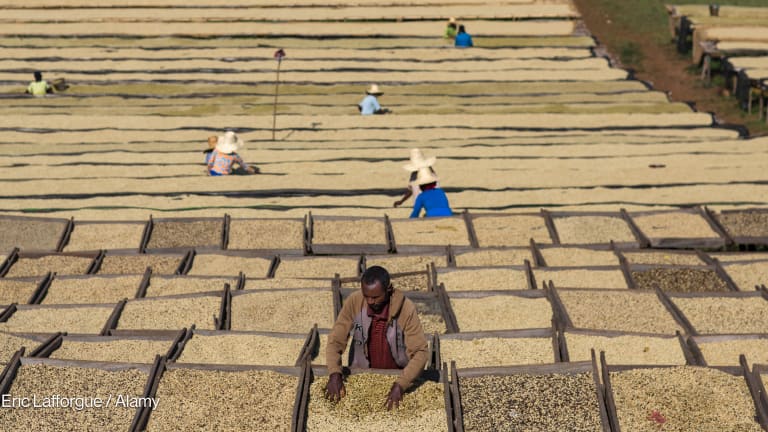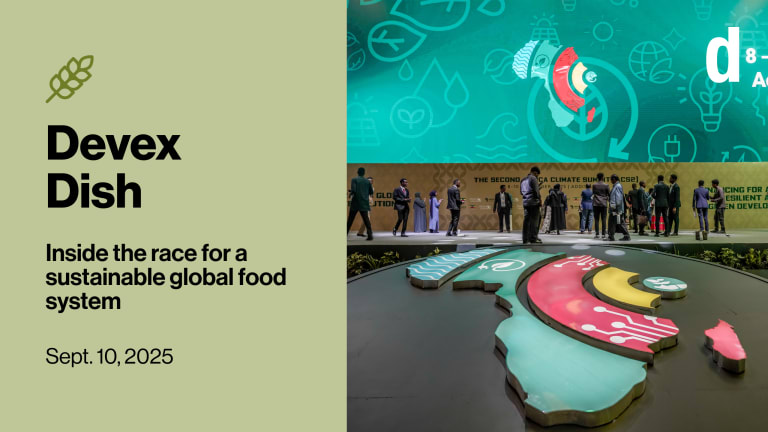
At the end of November, European and African leaders will meet in Tripoli to craft a follow-up to the 2007 Africa-EU Strategic Partnership action plan.
The meeting in Libya comes three years after a similar gathering in Lisbon, Portugal, which launched the Africa–EU Strategic Partnerships based on a joint strategy and an action plan that sought to foster strategic partnerships in eight priority areas: peace and security; democratic governance and human rights; trade, regional integration and infrastructure; Millennium Development Goals; energy; climate change; migration, mobility and employment; and science, information society and space.
Key to the upcoming summit’s success, according to Maxwell Mkwezalamba, African Union commissioner for economic affairs and former principal secretary of Malawi’s Ministry of Finance and Economic Planning, will be the provision of resources.
In an exclusive interview with Devex, Mkwezalamba previews some of the main issues the summit will focus on – from the coordination of development policies to the improvement of South-South cooperation.
At the upcoming summit in Tripoli, a second action plan will be adopted. What are the lessons learned from the adoption of the first one? What are the priorities this time around? And what will the new action plan address in terms of geographical and sector coverage?
In the implementation of the first action plan, a lot of time was spent on putting implementation structures in place, including those for joint expert groups. We believed that, with these structures operational, they would facilitate the implementation of the second action plan. However, there was also the lingering idea that the implementation of the first action plan was more difficult than originally conceived because resources were not immediately identified. Of course, in the strategy document, there were indications as to where some of these resources would come from. But, in reality, these resources were not there or were not accessible. So, as we prepared the second action plan, we discussed the issue with our European partners and they agreed that we had to ensure we had resources available for implementation: resources from both European and African sides.
Another thing we thought we needed to emphasize this time around were benchmarks, time frames and the identification of people responsible for implementation. There’s also the issue of coverage. The first action plan covered a lot. For the second one, we should focus on regional projects. We must also make sure that all players are actively involved, particularly on the African Union side. We want member states, as well as regional economic communities, to be fully involved in implementing this new strategy.
In the second action plan, which sectors will you focus on?
We will take into account the priorities of the African Union. The partnership remains the same but in terms of activities and projects, things will be different. As I’ve said, we need to focus on projects that are regional and continental in nature, but we also need to look at putting more emphasis on some of the African Union’s priorities. Four priority areas that have been identified are: agriculture and food security; infrastructure, including transportation; energy; and information and communication technologies. These are the critical areas for us, particularly as we move forward with our integration and development agenda.
In order to achieve these goals, do you think new financial instruments are required?
Yes. New financial resources are needed. As an example, we are looking at the successful implementation of the “Peace and Security” partnership and we believe that its success was largely because resources were available. There has been a proposal to establish an African Integration Fund and we are engaging the assistance of the European Union in looking into the modalities for the establishment of this fund. On the African side, we are also seeing the viability of developing funding sources for the African Union, which should help us finance the African integration agenda. So, we are looking at airfare and import levies among others. We believe these [instruments] should help us mobilize adequate resources for the implementation of our strategy. We are also in discussion with member states on the need to mobilize domestic resources by perhaps more efficient tax collection, a broader tax base and improved public expenditures management.
In Africa, there are multiple regional organizations. Are there strategies to assure the coherence of their policies and actions?
It is important that we work closely with regional and local communities. For us, they are the building blocks of the African Union. Obviously, there are issues surrounding overlapping memberships but this matter has to be addressed continentally. In fact, there are some regional economic organizations that have already started working together to harmonize and coordinate their policies. This is the case with the Common Market for Eastern and Southern Africa, East African Community and others.
At the level of the African Union, we are also coordinating with regional economic communities and developing a coordination program that will help in our efforts. There are areas that have been identified for the implementation of this coordination program.
I also want to mention that we do meet regularly with regional economic commissions. In fact, there is a protocol that defines relations between the African Union and regional economic communities – and this has been the framework for our collaboration with the said communities. Our work with the EU has also been on the agenda of these meetings.
The Cotonou agreement defines the relationships between the EU and 79 countries from Africa, the Caribbean and the Pacific. It establishes a kind of preferential channel for these countries in terms of resources for development. Do you think the revision of the Cotonou agreement would help to facilitate your work in Africa and give more coherence to the collaboration between the EU and Africa?
I think it is important to look at that. It should establish how Africa can be treated as one entity. This obviously requires an examination of the Cotonou agreement and the inclusion of the issue of economic partnership agreements, which we are also discussing. For us, yes, economic partnership agreements provide opportunities but I think we have to ensure that these agreements address Africa’s issues as a continent, including making sure they have a development dimension. They should also take into account some issues of concern such as export subsides, community leverage among others.
What is the role of South-South cooperation? Will it be strengthened and how?
This is something that is on our agenda in the African Union. We are forging partnerships with countries from the South because we believe this a good way to promote sustainable growth and development within the continent.
Civil society organizations have a critical role to play in boosting development in Africa. Are you designing new projects to involve them?
Civil society and private sector organizations as well as other partners have an important role to play in Africa’s development. We are really involving various stakeholders in the programs we design. Within the Africa–EU framework, for example, the private sector is engaged through the EU-Africa Business Forum. Civil society organizations also heavily participate in the development of the second action plan and will be engaged in the implementation of that plan. Within Africa, the Economic and Social Council helps us with the formulation of policies and implementation of projects and programs we develop.
Coming soon: China’s investment and development strategy in Africa, and how the EU and other major donors are are reacting to it. Only on devex.com and in The Development Newswire.








